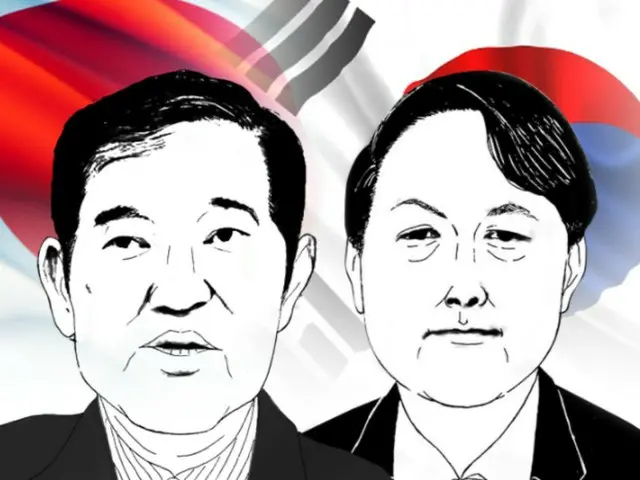On the 24th of this month, Korean government officials suddenly decided not to attend the memorial ceremony for the World Heritage Site "Sado Island Gold Mine" held in Sado City, Niigata Prefecture, and historical issues remain a hot topic.
He met with the Korea-Japan Parliamentary League, a cross-party group of Diet members, and said, "Although there are differences in ways of thinking between Japan and Korea, I want to develop relations for the future."
"By continuing the 'shuttle diplomacy' that was resumed by former Prime Minister Fumio Kishida and Yoon, in which the leaders frequently travel between the two countries, close cooperation between Japan and South Korea will continue," he said.
The report said, "The aim is to show that Japan and South Korea are continuing to maintain their good relations." Japan-South Korea relations, which were said to be at their worst since the war, have begun to move toward improvement since Yoon took office as president in May 2022.
The administration announced a solution to the former forced labor lawsuit issue, which was the biggest issue between Japan and South Korea. Former Prime Minister Kishida also took this opportunity to focus on rebuilding relations, and in March last year, "shuttle diplomacy" was resumed for the first time in about 12 years.
The two leaders continued to hold summit meetings after the summit, and exchanges between Japan and South Korea became more active not only in the political world, but also in the fields of business, sports, and between the private sectors.
Next year will mark the 60th anniversary of the normalization of diplomatic relations between Japan and South Korea, and the two governments will work to further strengthen cooperation.
Ishiba, who became prime minister in October, also intends to continue the relationship that Kishida built with Yoon, and has already met with Yoon twice since taking office.
The two met in Peru, where he visited in conjunction with the Asia-Pacific Economic Cooperation (APEC) summit. After the meeting, Ishiba emphasized the results of the talks, telling reporters, "We had a very in-depth discussion."
"I want to deepen discussions between the leaders, not just on security issues," he said ahead of the 2020 anniversary of the establishment of the Korea-Japan Security Council.
However, in connection with the World Heritage Site "Sado Island Gold Mine" in Sado City, Niigata Prefecture, a meeting was held on the 25th of last month in which all workers, including Korean former members who were killed at the gold mine,
South Korean government officials suddenly did not attend the memorial service for the war dead. The South Korean government explained that the reason for their decision not to attend was that the memorial speeches at the ceremony were not up to the standard agreed upon with Japan when they approved the registration of the site as a World Heritage Site.
The Sado Island Gold Mine was registered as a World Heritage Site in July of this year, but the South Korean government temporarily withdrew its support from the site, citing a history of forced labor by Korean former members.
The boycott of the ceremony by the South Korean side once again highlighted the deep-rooted nature of the issues surrounding the perception of history between Japan and South Korea, but on the 26th of last month, Foreign Minister Takeshi Iwaya stated that
During his visit to Italy to attend the Japan-South Korean Joint Comprehensive Plan of Action (JCPOA), he met with South Korean Foreign Minister Cho Tae-yol, who was also in attendance as an invited guest, and agreed to ensure that the issue surrounding the memorial ceremony would not affect relations between the two countries.
After the meeting, Iwaya told reporters, "We confirmed that we will continue to communicate closely at various levels."
In this context, Prime Minister Ishiba is making arrangements to visit South Korea before the regular Diet session opens in January next year.
Since taking office in October, Ishiba has traveled overseas twice to attend international conferences, including the Asia-Pacific Economic Cooperation (APEC) forum, but has never engaged in bilateral diplomacy.
The January visit to South Korea, which is currently being arranged, is expected to be the first such visit by a Japanese leader to the other country. The last time the leaders of Japan and South Korea visited each other's country was in September when former Prime Minister Kishida, who was about to step down, visited South Korea and spoke to Yoon Dae-seok in the presidential office.
The last time he met with the president was in 2016. The summit is expected to confirm the continuation and strengthening of strategic cooperation between Japan, South Korea, and Japan, the United States, and South Korea, with an eye on military actions by Russia, North Korea, and China.
He pointed out the circumstances under which South Korea did not participate in the memorial service for the workers of the Sado Island Gold Mine, and said, "The Prime Minister's visit once again demonstrates the importance he places on improving relations with South Korea and serves to prevent the escalation of conflict over historical issues."
Meanwhile, the South Korean presidential office said on the 28th, "The two leaders have agreed to continue shuttle diplomacy, but the date of the visit to South Korea has not yet been decided."
.
2024/12/02 13:27 KST
Copyrights(C)wowkorea.jp 5

